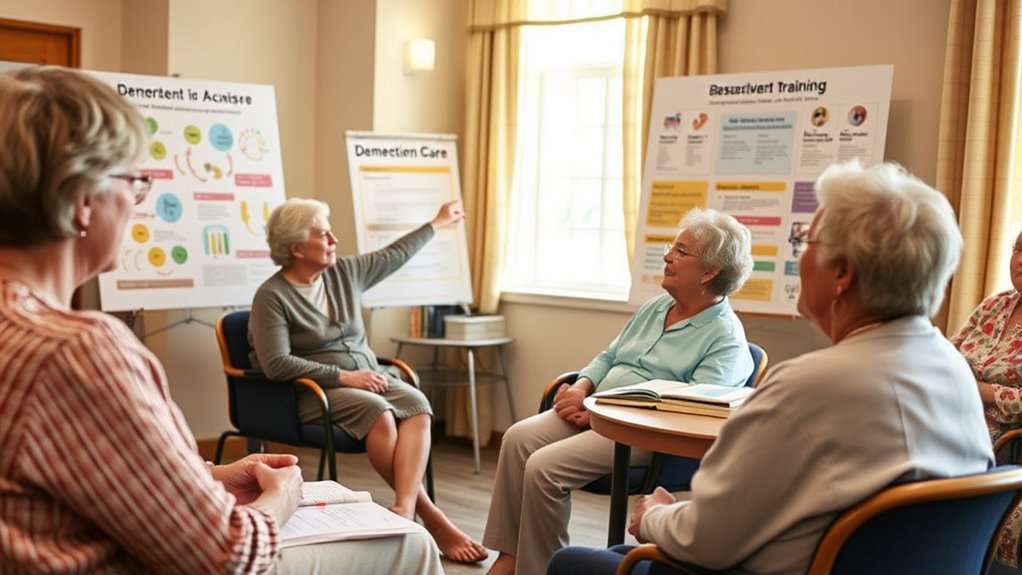Finding the right resources can make a big difference in caring for someone with dementia. Look for local and online support groups, which offer emotional connection and practical advice. Consider enrolling in workshops or online courses focused on dementia care strategies like managing behaviors and creating routines. Respite care services can give you necessary breaks, helping prevent burnout. Exploring these options will give you more tools and confidence to handle the evolving challenges of caregiving.
Key Takeaways
- Access local and online support groups for emotional support and shared caregiving experiences.
- Enroll in workshops and online courses on dementia care techniques and communication strategies.
- Utilize respite care services to provide caregivers with necessary breaks and prevent burnout.
- Learn behavior management strategies to handle agitation, aggression, and safety concerns effectively.
- Connect with community resources offering educational materials, safety tools, and practical caregiving assistance.

Resources for Dementia Caregivers
Caring for someone with dementia can be overwhelming, but numerous resources are available to support you through this challenging journey. As a caregiver, you’re likely to face complex emotional and physical demands, especially as memory loss progresses. It’s normal to feel exhausted, frustrated, or overwhelmed at times, and that’s why seeking out the right training and support is essential. Education about dementia helps you understand the disease process, enabling you to respond more effectively to behavioral changes and communication difficulties. Many organizations offer workshops, online courses, and support groups designed specifically for caregivers, providing practical strategies to handle daily challenges. These resources can teach you techniques for managing memory loss, such as creating routines, using memory aids, and simplifying tasks to reduce confusion. They also cover ways to promote safety, like fall prevention and managing wandering, which are vital as cognitive decline accelerates.
Recognizing caregiver burnout early is paramount to maintaining your well-being. Burnout often manifests as emotional exhaustion, irritability, and a sense of helplessness, which can impair your ability to provide compassionate care. Fortunately, there are support programs tailored to help you cope with these pressures. Support groups, whether in person or online, connect you with others who understand your experiences. Sharing stories and advice can lessen feelings of isolation and provide new perspectives, reducing stress. Many organizations also offer respite care services, giving you a break to rest, recharge, and attend to your own health. Learning to delegate tasks and accept help from family, friends, or professional caregivers can ease the burden and prevent burnout.
Training programs often include guidance on managing difficult behaviors, such as agitation or aggression, that stem from memory loss. These sessions will teach you patience and techniques to redirect or calm your loved one, which can reduce frustration for both of you. Additionally, many resources emphasize the importance of self-care, encouraging activities that restore your energy and mental resilience. Regular exercise, proper nutrition, and mindfulness practices are often recommended to combat stress and promote emotional well-being. Understanding emotional support can also help you cope with the feelings of grief and loss that frequently accompany caregiving.
In essence, taking advantage of educational programs, support groups, and respite services empowers you to provide better care while safeguarding your own health. Remember, you don’t have to face this alone. The more informed and supported you are, the better you can navigate the ups and downs of dementia caregiving, especially when memory loss becomes more pronounced and caregiver burnout threatens your resilience.
Frequently Asked Questions
How Can I Find Local Support Groups for Dementia Caregivers?
To find local support groups for dementia caregivers, start by asking your healthcare provider or visiting community centers. You can also search online for local organizations focused on dementia care or join community engagement events. These groups offer emotional support and practical advice, helping you connect with others who understand your challenges. Don’t hesitate to reach out—building a support network makes caregiving more manageable and less isolating.
Are There Online Training Programs Available for Caregiving Skills?
You can find online training programs to improve your caregiving skills through various platforms offering online courses and virtual workshops. These programs provide flexible, accessible learning options that fit your schedule. Look for reputable organizations or healthcare providers that offer thorough, evidence-based content. By participating in these online courses and virtual workshops, you’ll gain valuable strategies and confidence to care for your loved one effectively.
What Financial Assistance Options Exist for Dementia Care Support?
You can explore financial assistance options like Medicaid planning and financial planning to support dementia care. Medicaid often covers long-term care, so you should start early to qualify. Additionally, consider applying for state or local programs that offer financial aid. Creating a detailed financial plan helps manage expenses and guarantees you access all available resources, easing your caregiving journey.
How Do I Access Respite Care Services in My Area?
Some believe respite care is hard to access, but it’s more available than you think. To find respite care services in your area, start by checking community resource centers or local health departments. Eligibility for respite care varies, so contact these centers directly to learn about specific requirements. They can guide you through the process and help you arrange temporary relief, ensuring you get the support you need to care for your loved one.
What Legal Resources Are Recommended for Dementia Caregivers?
You should explore legal resources that help protect your caregiver rights and ensure proper legal documentation. Look for local legal aid organizations, elder law attorneys, or caregiver support groups that offer free or low-cost consultations. They can guide you through establishing powers of attorney, understanding your rights, and maneuvering guardianship. Staying informed about legal documentation helps you advocate for your loved one and secure the support you need.
Conclusion
Taking advantage of available training and support resources can make a real difference in your caregiving journey. Did you know that nearly 60% of caregivers report feeling overwhelmed? Accessing the right tools and community support can help reduce stress and improve care quality. Remember, you’re not alone—help is available to guide you through this challenging but rewarding experience. Reaching out can make a meaningful difference for both you and your loved one.









